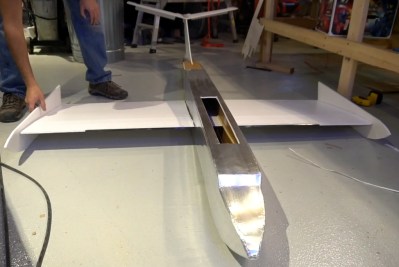In the 1960s the Soviet Union began experimenting with what they called ekranoplans, ground effect vehicles (GEVs) that were something of a hybrid between a ship and a large airplane. Their stubby wings didn’t provide enough lift for the vehicle to fly in the traditional sense, the craft essentially rode on a cushion of pressurized air produced by the aerodynamic interaction between the wings and the surface of the water. But after decades of testing, the ekranoplan never became much more than a curiosity for American intelligence agencies to ponder over.
Now [Peter Sripol] has built his own version of what the CIA dubbed the “Caspian Sea Monster”, and judging by the video of him “flying” it around a lake, the design seems to tick all the boxes. The advantage of a GEV is that it’s far faster than a ship and more fuel efficient than an aircraft of similar size. They also operate low enough to avoid enemy radar, which made them very appealing for military applications. Not that any of those characteristics apply to an RC vehicle, but at least it looks cool.
 Ironically, it took some extra effort for [Peter] to keep his scratch built ekranoplan from getting airborne. Built out of foam covered with aluminum tape, the craft was light enough that even the tiny wings were enough to break it free from the ground effect if it got going fast enough. It didn’t help that the electric ducted fan motors used were probably a bit too powerful as well.
Ironically, it took some extra effort for [Peter] to keep his scratch built ekranoplan from getting airborne. Built out of foam covered with aluminum tape, the craft was light enough that even the tiny wings were enough to break it free from the ground effect if it got going fast enough. It didn’t help that the electric ducted fan motors used were probably a bit too powerful as well.
But by carefully adjusting the throttle and control surfaces, [Peter] was able to keep his craft firmly planted in the ground effect most of the time. Seeing the large RC craft floating just a few inches over the water is very impressive, and thanks to the application of some Soviet-style iconography on its burnished aluminum body, it looks like found-footage from a Cold War test program.
Hackaday readers will likely be familiar with [Peter] and his exploits. From building his own human-scale airplane out of foam board to convincing a cordless drill that it can fly, he’s creations have never been overly concerned with the status quo.
No comments:
Post a Comment